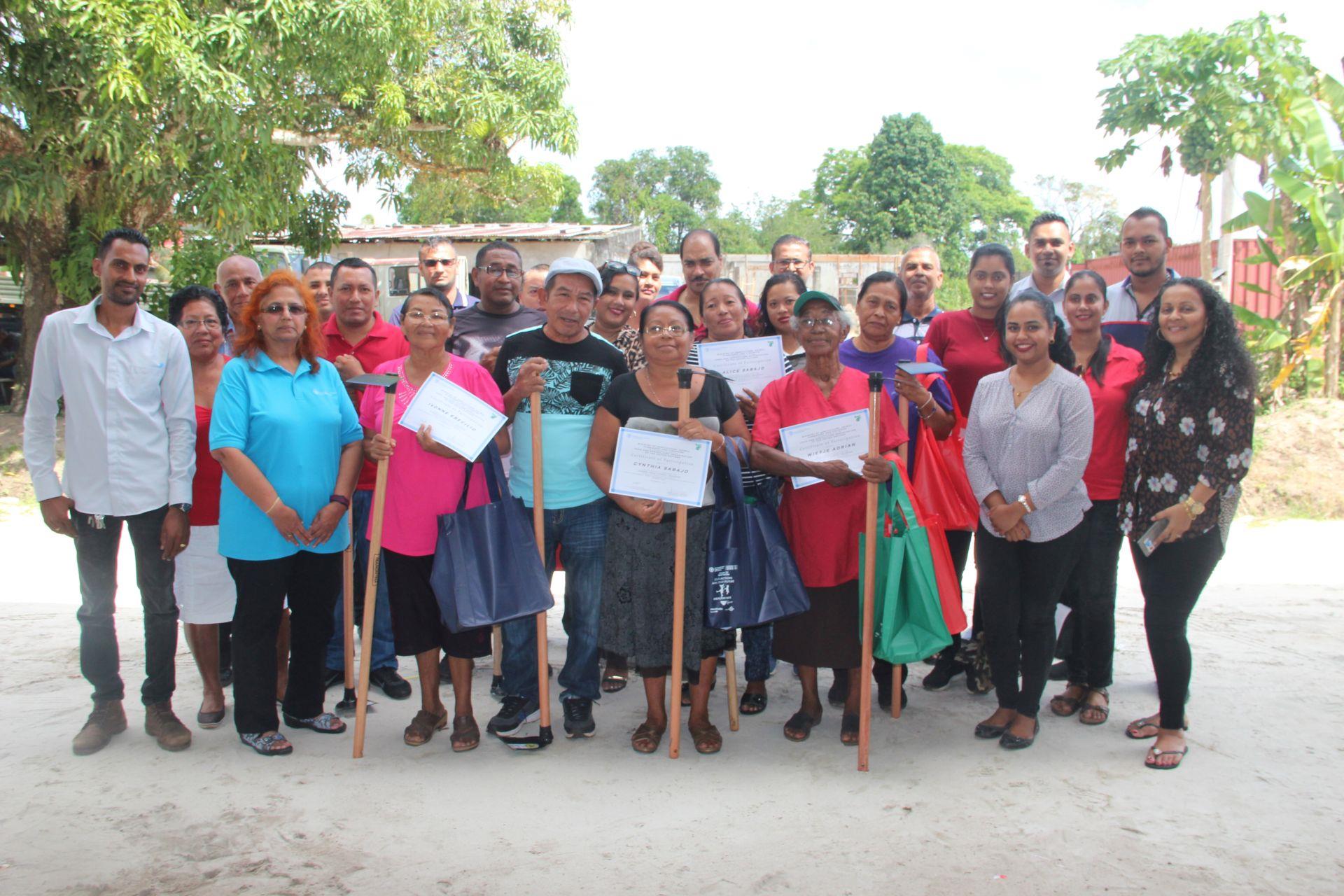Indigenous farmers from the villages of Matta and Powakka in Lelydrop, Suriname graduate from The Cassava Farmer Field School

November 10, 2019 – Lelydrop, Suriname – Proud and ecstatic were the overall sentiments expressed by the indigenous farmers who graduated from the Farmer Field School on November 7 at the Lelydrop, Wanica District in Suriname. The Farmer Field School was funded by The Caribbean Development Bank (CDB) and executed by the Food and Agriculture Organization of the United Nations (FAO). However, The Ministry of Agriculture, Lands and Fisheries (MALF), under a Government Cooperative Programme (GCP) Agreement worked in close collaboration with FAO to implement the program.
After an arduous 9 months of training came to an end, these farmers have gained invaluable knowledge and experience on cassava development, on-farm research and dissemination of new cassava production technologies to increase yields. The production will be linked to markets for value added products such as cassava mash and kokori (cassava porridge). The market assessment potential of these products under the project was also supported by FAO.
The eleven farmers were made up of 8 females and 3 males who excitedly walked the stage to collect their certificates from Dr Vyju Lopez, Plant Production and Protection Officer at FAO, with beaming family members, farmer field school facilitators (Extension Officers, who conducted the training) cheering them on from the audience.
The farmer field school started in January 2019 and has the potential to contribute significantly to improved livelihoods of the farmers, while empowering the women towards self-sufficiency so they are better able to provide for their families.
Dr Vyju Lopez who presented the farmers with their certificates stated that the women involved in the project participated in all activities from liming of the soil and planting cassava sticks to fertilizer application doing plant counts, and conducting measurements in the field.
She added that, “I am immensely proud of these graduates, many of whom have been producing cassava nearly all their lives. They have worked extremely hard during the 9 months of training, and have demonstrated perseverance and an eagerness to learn and gain new knowledge. I am confident that they will not only improve the production and productivity of their own cassava farms but will train other females in their communities”. Dr Lopez also indicated that prior to the graduation ceremony, the farmers were asked what they wanted as a graduation present and they unanimously wished for a garden hoe. So, on graduation day, each farmer was presented with a garden hoe which will be used in his or her respective farms.
Mr Ashween Ramdin, Permanent Secretary in the Ministry of Agriculture who was one of the featured speakers at the graduation ceremony stated that the farmer field school was very important for those in the interior of Suriname. He stated, “It was after a very long time that we did such a Farmer Field School training in cassava”. In wishing the graduates continued success, he requested that they implement the knowledge gained during the 9 month training. Mr Ramdim added, “If any of you need any more information or help anytime, you are welcomed by the Ministry”.
During the graduation ceremony, Ms Tania Lieuw-A-Soe, host farmer and Mr Nareen Gajadin, master trainer, also presented certificates to the graduates.
One of the graduates, Ms Miriam Ebecillio stated that the training was very useful for them and they learnt a lot during the 9 months, including how to plant, to observe the pest and diseases, when to use fertilizers, better weed control and overall about the crop maintenance.
Meanwhile, fellow graduate Mr Carlos Sabajo expressed how thankful he and the graduates were for the intensive training, “We are very grateful to the Ministry of Agriculture, Animal Husbandry and Fisheries and also FAO and CDB for their invaluable assistance and partnership”, he stated.
Through the upcoming period of January to October 2020, it is anticipated that a second farmer field school will commence in Saramacca and The Ministry of Agriculture will begin to evaluate new varieties of cassava that have been introduced into Suriname.
Contact
Marquita Sugrim FAO National Communications Consultant 1-246-467 6241 [email protected]
